When someone searches your brand name today, they’re not just getting a list of links. They’re getting ✨answers✨. A tidy, confident AI-generated summary, delivered by Google’s AI Overview (AIO), ChatGPT, Gemini, Perplexity, or some other digital oracle.
And here’s the kicker:
A 2024 Cornell Tech study found that users are significantly more likely to trust and click on AI-generated answers when they include citations, whether or not the information is accurate.
In other words, even if the answer is wrong, people are going to believe it. Which means your brand’s reputation may be shaped, and reshaped, by machines that summarize you without context, nuance, or your input.
Welcome to the era of AI reputation management, where how your brand is interpreted by machines is just as important as how it’s perceived by humans.
This article is your guide to:
- How LLMs understand and surface your brand
- What shapes your machine-readable reputation
- How to fix it if AI is getting it wrong
Basically, you’re not just being Googled. You’re being summarized. It’s time to take control of the narrative.
What Is AI Reputation Management?
Because LLMs have revolutionized the search experience, when most people hear “AI reputation management,” they think of using AI to manage the brand’s image itself. Think of an algorithm firing off a polite “Thanks for your feedback” reply to angry Yelp reviews, but let’s clarify that is definitely not what we mean here.
AI reputation management isn’t about what you do with AI. It’s about how AI perceives you.
Large language models (LLMs) like ChatGPT, Gemini, Claude, and Perplexity are now mainstream discovery tools, meaning your brand is being summarized, cited, and surfaced in answers; sometimes without you even knowing it (but you should). Your business might not have a Wikipedia page, but that doesn’t keep AI from confidently telling users who you are, what you sell, and whether you’re worth their time.
In other words, your reputation is no longer about just what Google has to say about you (or what you put out on Google). It’s also about how AI thinks of you.
Traditional reputation management is about controlling the narrative across Google results, review websites, and social media. AI reputation management takes that same principle and applies it to LLM systems, which draw from those same sources but with less context, more confidence, and no chill.
So now, you’re managing your brand for a new audience:
- Not just customers, but the machines that those customers trust
- Not just press, but the algorithms remixing your press releases
- Not just rankings, but summaries, citations, and AI overviews
AI reputation management means getting intentional about how your brand is being represented in the data LLMs train on, ingest from, and reference. It ensures that when someone asks ChatGPT, “Is [your company] legit?” The answer is always yes and well-sourced.
How Do LLMs “Understand” Your Brand?
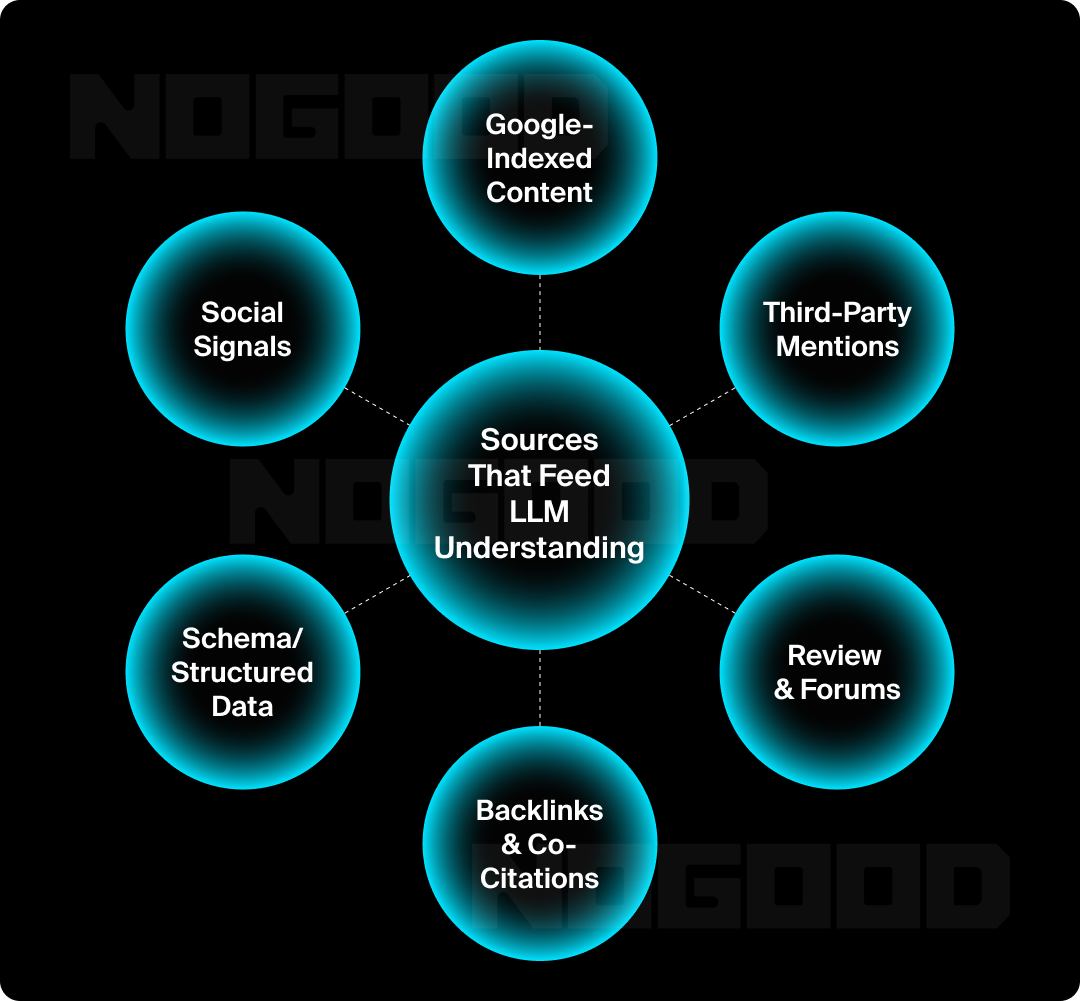
Spoiler: They’re not just visiting your homepage and admiring your logo and color palette.
When LLMs “understand” your brand, they’re not reading your About page with a thoughtful nod. They’re scraping, crawling, ingesting, and statistically predicting your brand’s identity based on the data trails you’ve left across the internet.
And they don’t just look at what you say about yourself; they’re looking at what everyone else is saying too.
So…What Are LLMs Looking At?
Here are some of the types of inputs that inform how your brand shows up in AI answers:
- Google-Indexed Content: Blog posts, product pages, landing pages, and FAQs are all fair game. If it’s publicly crawlable, it’s part of the record.
- High-Authority Third-Party Sites: News outlets, review platforms, directories, and “best of” listicles. These carry disproportionate weight in how LLMs validate and describe your brand.
- Online Reviews & Forums: G2, Trustpilot, Reddit, and even niche review blogs. LLMs love summarizing the “general sentiment,” which means a few outlier reviews can skew the narrative.
- Backlink Profiles & Co-Citation Patterns: Who’s linking to you? Who’s mentioning you alongside competitors? These signals help LLMs infer category, credibility, and associations.
- Structured Data & Schema Markup: Nerdy but important. Schema helps machines “understand” what’s what, products, reviews, pricing, locations, etc.
- Social Content (to a degree): Public tweets, Reddit threads, YouTube transcripts, especially if they get linked to or quoted elsewhere.
TL;DR: LLMs Build a Franken-Brand
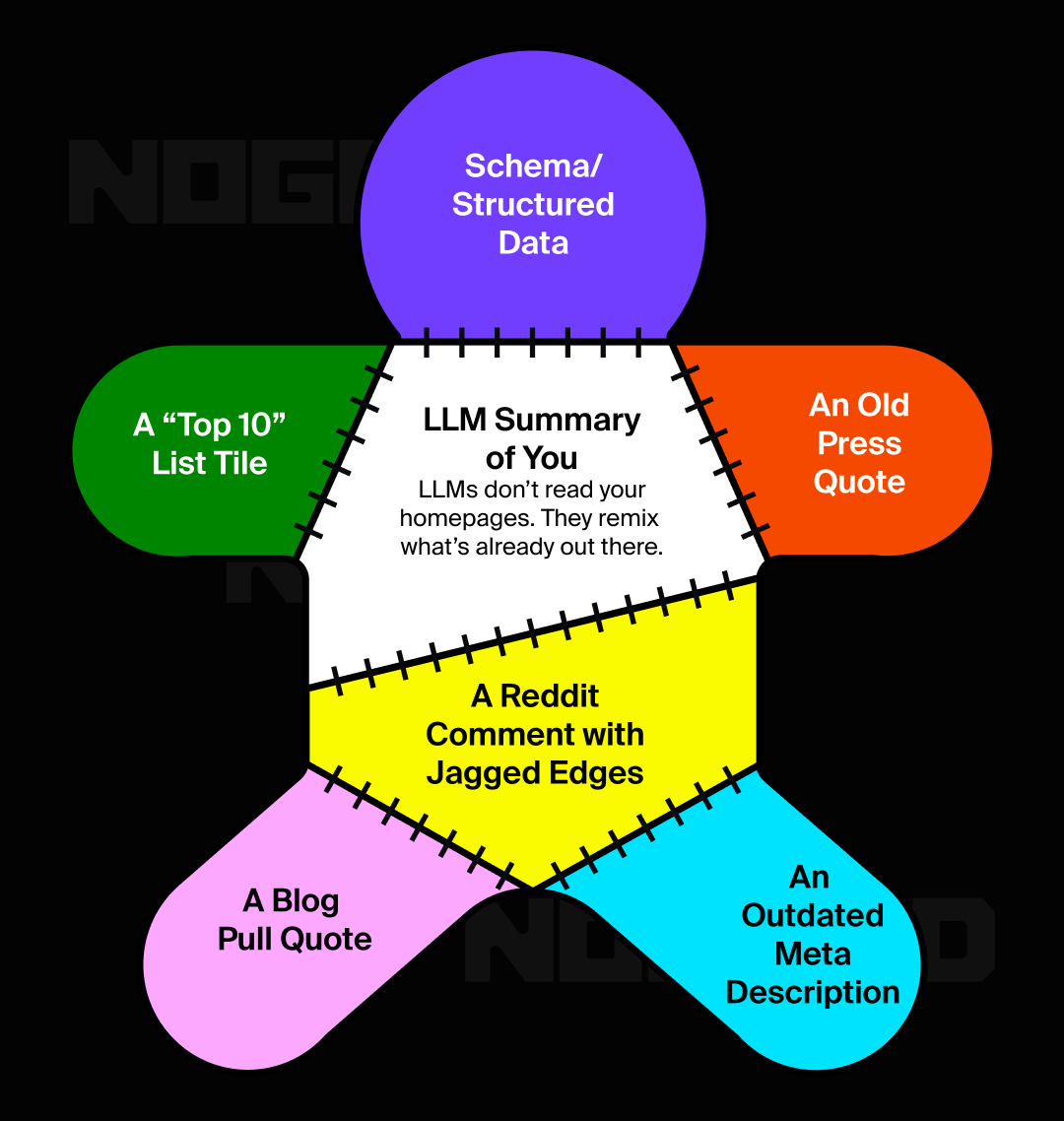
AI doesn’t pull from a single source. They stitch together a Frankenstein version of your brand based on scattered, often contextless data points. If your web presence is messy, inconsistent, outdated, or dominated by affiliate blogs and random Reddit takes, that’s going to be the brand AI sees.
This is why managing your AI reputation isn’t about just adding more content; it requires shaping the data that LLMs find, trust, and remix into answers.
How Google’s AI Overview & LLMs Surface Brands
You can’t control whether people search up your brand or not. But you can control what they find.
People aren’t just “looking up” things anymore. They’re asking AI open-ended questions like
- “What’s the best tool for X?”
- “Is [your brand] legit?”
- “What’s the difference between Brand A and Brand B?”
And increasingly, it’s AI that answers; not Google’s 10 blue links.
So, where is your brand showing up? Let’s break it down:
Google AI Overviews
- Live at the top of certain Google Searches (especially informational queries)
- Pulls data from multiple sources to generate a single summarized response
- Your brand might appear:
- In the Overview Summary (with or without a citation)
- As a link in the “Sources” box
- In adjacent SERP modules like People Also Ask or Featured Snippets
What Influences Visibility?
- Google’s E-E-A-T signals (Experience, Expertise, Authoritativeness, Trustworthiness, but we also like to add an H for Helpfulness✨)
- Structured content, schema, and strong internal linking
- Citations on high-authority external domains
ChatGPT (with Browsing or via Plugins)
- ChatGPT doesn’t index the web like Google does. Instead, it pulls from its training data and, when browsing is enabled, scrapes live content in real time.
- Your brand might appear:
- As a direct answer (e.g., “Top social media agencies in NYC”)
- In source links or suggested readings
- As part of a broader comparison or opinion
What Influences Visibility?
- Mentions on trustworthy, well-structured websites
- Co-citations with other relevant brands
- Clear content that aligns with common user queries
Perplexity.ai
- Think of it as AI search meets research assistant
- Always cites sources, giving brands a visible entry point
- Your brand might appear:
- As a direct source
- In the “related” tab (co-mentioned with similar companies)
- In visual cards for company overviews
What Influences Visibility?
- Structured, relevant content on your website
- Third-party mentions with high domain authority
- Clear brand signals: what you do, who you serve, why you’re credible
Gemini (Google’s AI Chat)
- Similar to ChatGPT but more tightly integrated into Google’s ecosystem
- Pulls from search index and emphasizes Google-favored sources
- Your brand might show up:
- In AI summaries
- In Suggested Links or “Learn More” modules
- In comparative responses (“Best X for Y”)
What Influences Visibility?
- Strong SEO fundamentals
- High-quality backlinks
- Positive reviews across Google and verified review platforms
The Takeaway
Whether it’s Gemini summarizing your product features, or Perplexity citing a customer review, your brand can show up anywhere the AI sees fit. But if you’re not managing the inputs, your content, your reviews, your mentions, then you’re letting LLMs build their own version of your brand.
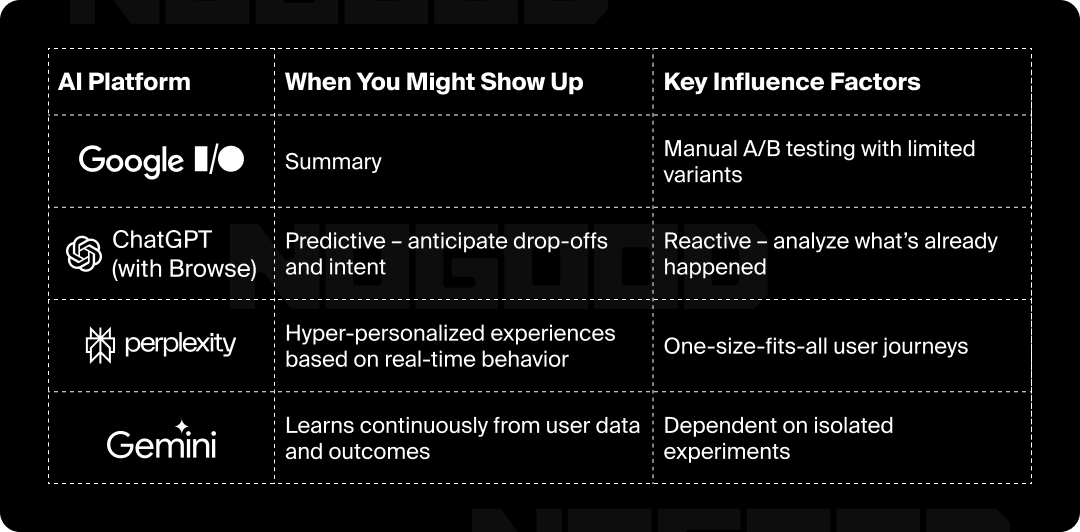
What Shapes Your AI Reputation?
AI models don’t have opinions, they have math!
They predict what words are likely to come next based on all of the data they’ve consumed, meaning inputs matter a lot. And in this case, those inputs? Consider them your digital breadcrumbs.
If you want to shape what AI says about you, you need to shape what it can see.
Here are the biggest influences on your AI reputation:
Online Reviews (Yes, They Still Matter)
Reviews are like tiny digital testimonials that LLMs love to summarize, especially when they appear on:
- Google Reviews
- G2, Capterra, Trustpilot, Yelp
- Reddit, Quora, or niche industry forums
The volume, recency, and tone of reviews can tip the AI scales in your favor (or very much against you).
Third-Party Mentions
Mentions on external domains help LLMs triangulate:
- Who you are
- What you do
- Whether you’re trusted in your category or not
High-authority media coverage, inclusion in “best of” lists, and being cited alongside reputable competitors = all gold.
AI trusts what other humans have already deemed credible.
SEO Content & Site Structure
No surprises here; your own website still matters. But it’s less about flash and more about:
- Structured content with clear headers and schema
- Internal linking to guide context
- Clear answers to common questions
Think less “vibes” and more “machine-readable clarity.”
Brand Consistency Across Channels
LLMs are pattern-matchers. If you’re called “NoGood Marketing” in one place, “NG Media” in another, and “that one growth agency” somewhere else, you’re diluting your authority.
- Keep brand name, description, and tone consistent
- Use schema markup for organization and product information
- Maintain alignment across your website, socials, and PR content
Social & Community Signals
While LLMs aren’t scraping every tweet in real time, aggregated sentiment from forums, Reddit, YouTube transcripts, and social embeds in articles still shape perception.
If your brand is being discussed positively and cited frequently, AI is more likely to surface you as a trusted name.
Co-Citations & Contextual Mentions
Are you getting mentioned with other reputable brands? Are you a part of industry comparisons or thought-leadership roundups?
- Co-citation = topical authority
- Helps LLMs classify your brand in the right category
- Increases chances of being pulled into “best X for Y” answers
TL;DR: LLMs build your brand narrative like a collage. Reviews here, a quote there, a few listicles, maybe a blog post from 2017; and that’s what shapes your AI reputation.
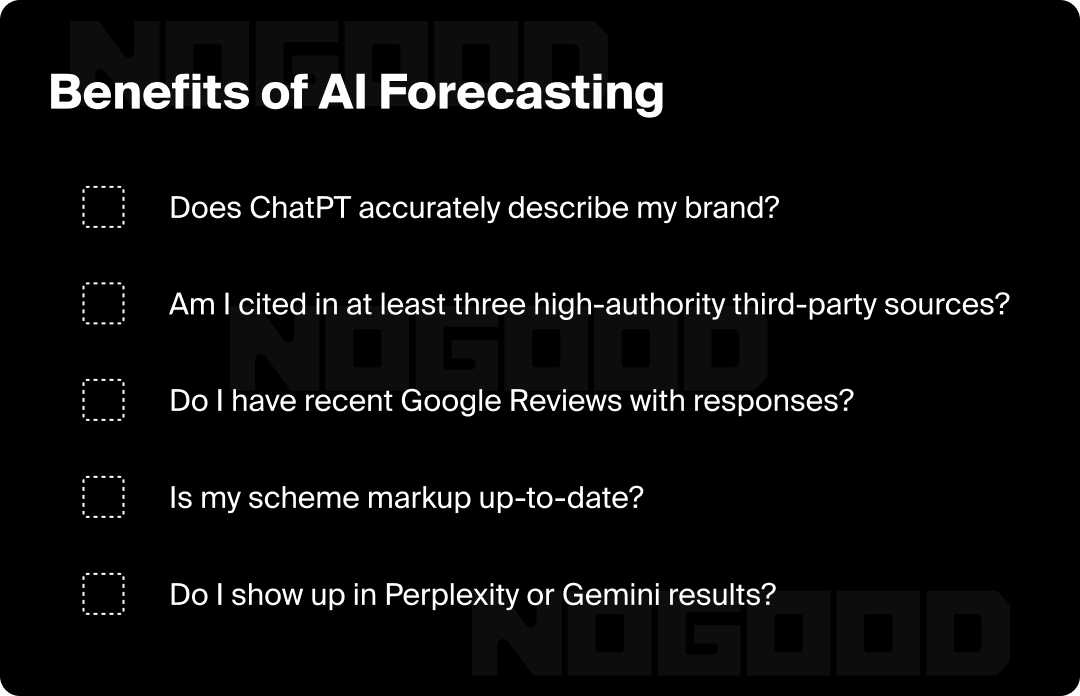
Reputation Risks in the LLM Era
In the old days, a bad review might hurt your star rating.
In the reign of LLMs, a bad review can be summarized into your brand identity.
Large language models don’t just reflect what’s out there. They remix it, distill it, and serve it back with startling confidence. And while that’s certainly impressive, it also introduces some real risks for brands that aren’t paying attention.
Here’s what is at stake:
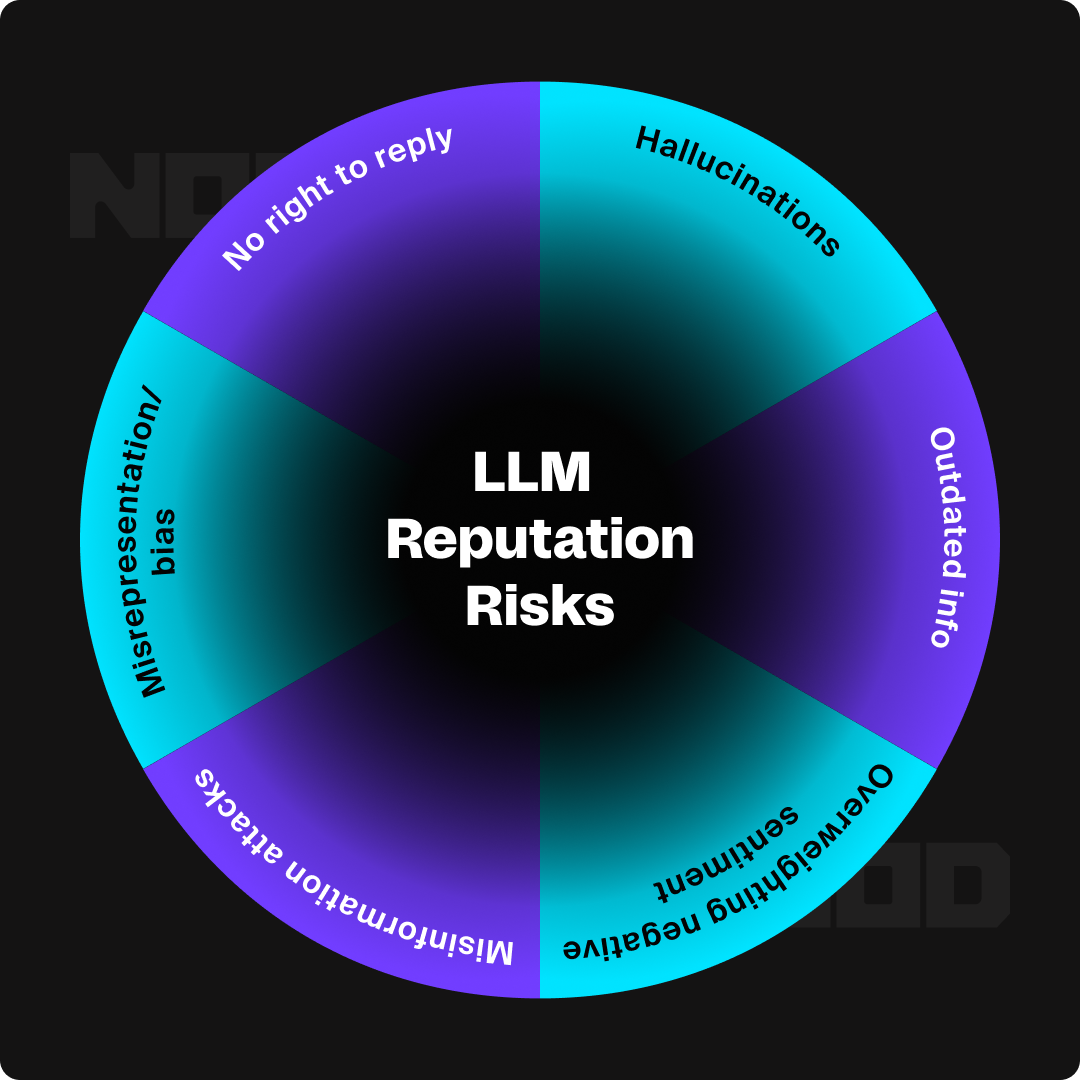
Hallucinations (a.k.a. AI Making Stuff Up)
LLMs are trained to predict language, not fact-check it. That means:
- A product you never offered might appear in a comparison table
- A bad review could be paraphrased into a “general consensus”
- You might be misquoted… or even invented
The more gaps there are in the data, the more likely AI is to fill them in with fiction.
Outdated Information That Won’t Die
LLMs train on snapshots in time. If your most visible coverage is from 2019, don’t be surprised when that’s what gets cited, especially if you haven’t published (or been mentioned) more recently.
Also, even real-time browsing models like Perplexity or ChatGPT with browsing still surface older content if it has more authority.
Overweighting Negative Signals
LLMs don’t know that one unhinged Reddit thread ≠ universal sentiment. But if it’s indexed, linked to, and shows up in multiple places, it might become the version of your story AI retells.
- One viral complaint could override hundreds of happy customers
- Negative content often gets more engagement = more citations
No Right to Reply (Yet)
On review sites, you at least get the chance to respond.
On Google, you can submit feedback.
But when ChatGPT says something incorrect or unflattering, you have no direct control over how (or whether) it gets fixed.
And when that info gets picked up and cited by others? The cycle continues.
Bias in the Training Data
If you’re a newer brand, niche brand, or serve underrepresented markets, LLMs might have trouble placing you accurately or at all.
- You might get lumped into the wrong category
- Your competitors may appear as “better-known” alternatives
- Cultural nuance, local context, and brand voice often get flattened
LLMs reward what’s already prominent. If your brand isn’t actively building presence, it risks being erased or misrepresented; we’re not sure which one’s worse.
Misinformation Campaigns
Bad actors can deliberately target your brand with:
- Coordinated review bombing
- SEO spam and fake content
- Deepfake content or social disinformation
In a world where AI is summarizing everything, even fringe content can bubble up to the surface fast.
Final Word?
If SEO was about visibility, AI reputation management is about control. You don’t just want to be found; you want to be understood correctly.
How to Manage Your Reputation for AI
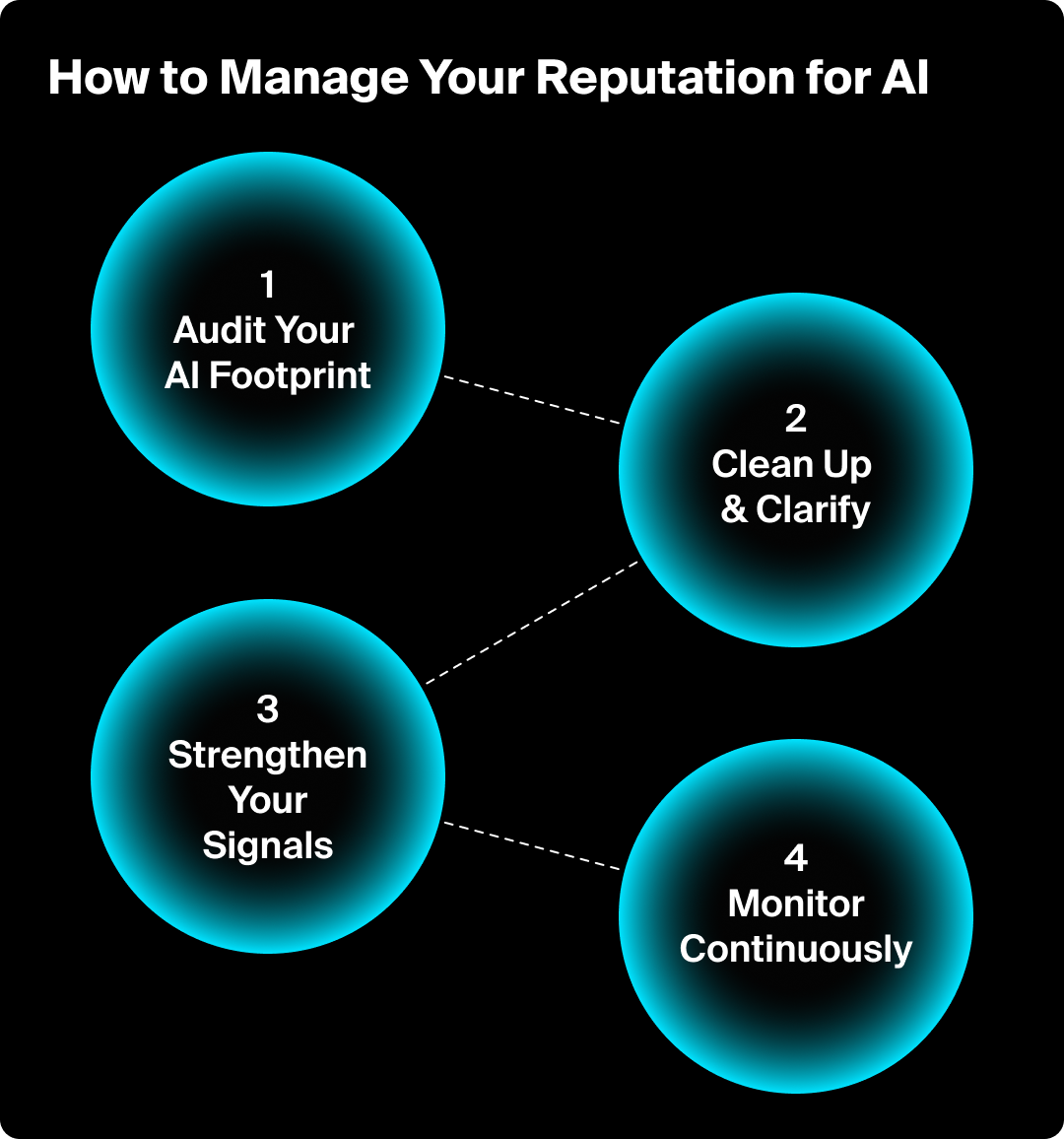
Alright, we’ve talked about how LLMs perceive your brand, where they pull that info from, and all of the ways things can go sideways. Now, let’s talk damage control meets opportunity.
Managing your AI reputation isn’t about chasing every random mention; it’s about strategically shaping the narrative LLMs are most likely to see, trust, and repeat.
Here’s your four-part playbook:
Step 1: Audit Your AI Footprint
You can’t manage what you haven’t seen.
Start by searching for your brand like an AI would:
- Google your brand name + product category
- Ask ChatGPT or Gemini to describe your company
- Use tools like Perplexity or Goodie to see where and how you’re cited
- Check Reddit, Quora, and high-traffic review websites
Take note of what’s outdated, what’s inaccurate, and what feels off-brand. That’s your fix list.
Step 2: Clean Up & Clarify
Now that you know what AI might be seeing, start patching up the leaks:
- Update stale or neglected content (old blog posts, landing pages, About pages)
- Submit corrections where possible (review platforms, Wikipedia, Google Business)
- Consolidate your messaging; make sure your brand’s value props, product names, and bios are consistent everywhere
Your goal is to reduce confusion and reinforce a unified brand identity.
Step 3: Strengthen Your Signals
Here’s where you get proactive. To shape how LLMs perceive you, give them better building blocks:
Get Mentioned in the Right Places
- Pitch thought leadership to high-authority media
- Aim to be included in “Best of” lists and comparison roundups
- Co-author or collaborate with established brands or creators
Encourage (Legit) Review Generation
- G2, Trustpilot, Google Reviews, and niche sites
- Prioritize quality and specificity over quantity
- Always respond, LLMs pick up on that, too
Add Structure to Your Content
- Use schema markup for products, reviews, org info, and FAQs
- Optimize your site for AEO (Answer Engine Optimization); clear, concise, question-driven content
- Add internal links to reinforce authority and context
Think of this as “training the AI”; you’re feeding the machine the version of your brand you want to be repeated.
Step 4: Monitor Regularly
LLMs and AI search platforms update fast. That means you can’t treat this project as a one-and-done.
Set up a cadence to:
- Track changes in AI-generated answers (especially in ChatGPT, Perplexity, Gemini)
- Monitor new citations, mentions, and reviews
- Watch for misinformation or misattribution
- Review what Goodie or similar tools pick up over time
This isn’t just PR, it’s performance marketing for machines.
Bonus Tip: Don’t Go It Alone
AI reputation management sits at the intersection of SEO, PR, customer experience, and product marketing.
Make it cross-functional. Loop in your SEO lead, your comms team, and your customer support head. The more unified your brand’s digital presence, the clearer your signal will be.
Tools for Monitoring & Influencing Your AI Reputation
(Spoiler: You’re probably going to want Goodie in your corner.)
Most brands have tools to monitor SEO. Some have tools for brand sentiment or social listening. But almost no one has a tool built to tell you how your brand is showing up in AI answers. That’s where Goodie comes in.
Here’s a breakdown of how to cover your AI reputation bases and where Goodie gives you a major edge.
Goodie: AI Reputation Monitoring (& AEO Engine)
Goodie is purpose-built for the AI search era. It doesn’t just tell you how your site is ranking, it shows you:
- Where your brand is appearing in LLM answers (like ChatGPT, Gemini, Perplexity, and Claude)
- Which sources these tools are pulling from when they mention you (or your competitors)
- What topics you’re being cited for, and where you’re being left out
- Your Answer Engine Optimization (AEO) opportunities; what questions you should be answering, where your content is missing, and how to fix it
Basically, Goodie = your brand’s AI visibility control panel.
What makes it different:
- LLM-specific visibility tracking
- Competitive benchmarking in AI search
- Tools for optimizing content specifically for answer engines (not just Google)
- First-party data on which citations actually influence AI outputs
Use it to:
- Monitor your brand’s “machine-readable” reputation
- Spot misinformation or missed opportunities
- Create content that LLMs are more likely to pull from
- Help your SEO, content, and PR teams work in sync
Other Tools That Still Matter (But Don’t Quite Cover AI)
Review & Sentiment Platforms: Birdeye, Trustpilot, G2, Google Business Profile
- Great for managing customer reviews and public-facing reputation data
- Important inputs for AI, but won’t tell you how LLMs are using that info
SEO Monitoring Tools: Ahrefs, SEMrush, Clearscope
- Still valuable for tracking backlinks, keywords, and authority
- Goodie complements these but doesn’t replace them
Media Monitoring Tools: Meltwater, Brandwatch, Talkwalker
- Useful for tracking press and social sentiment
- Can help identify brand mentions that LLMs might pick up on
TL;DR
Most tools help you manage what’s public.
Goodie helps you manage what machines actually see.
If SEO was built for Google, Goodie is built for what comes after.
Too Long; Didn’t Summarize? The AI Will
In the era of LLMs and AI search, your brand no longer just lives on your website. It lives in summaries. In sidebars. In conversational answers generated by machines that are scraping, stitching, and paraphrasing everything ever said about you.
If that sounds out of your control, don’t worry, it isn’t. But it does require a mindset (strategy) shift.
Reputation management isn’t just for PR anymore. It’s:
- An SEO strategy that considers how content is machine-readable
- A review strategy that feeds trustworthy signals to AI
- A content strategy that’s optimized for both humans and hallucination-prone bots
- A brand strategy that puts consistency above cleverness
The brands winning in this new landscape aren’t the loudest; they’re the clearest. The most cited. The most structured. The most helpful, across platforms and perspectives.
And if you’re not proactively managing your AI reputation?
The machines will happily do it for you.







